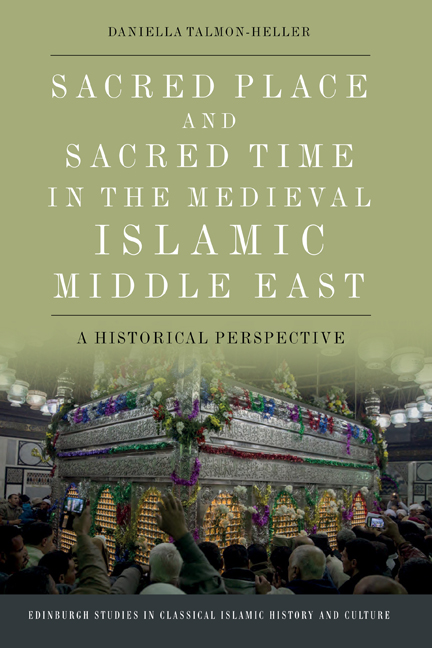Book contents
- Frontmatter
- Contents
- List of Figures
- Acknowledgements
- Map of the Middle East
- Introduction
- 1 Etic Concepts and Emic Terms
- 2 The State of the Art
- Part One A Sacred Place: The Shrine of al-Husayn’s Head
- Part Two A Sacred Time: The Month of Rajab
- Final Comments: Spacial and Temporal Sanctity
- Works Cited
- Index
15 - Rajab in Pre-Islamic Arabia and in Early Islam
Published online by Cambridge University Press: 17 October 2020
- Frontmatter
- Contents
- List of Figures
- Acknowledgements
- Map of the Middle East
- Introduction
- 1 Etic Concepts and Emic Terms
- 2 The State of the Art
- Part One A Sacred Place: The Shrine of al-Husayn’s Head
- Part Two A Sacred Time: The Month of Rajab
- Final Comments: Spacial and Temporal Sanctity
- Works Cited
- Index
Summary
In his succinct and definitely favourable description of the ethics of the people of Muhammad's tribe, the Quraysh, before the rise of Islam, the historian and geographer al-Yaʿqubi (d. 284/897) writes that they disapproved of immoral acts, severance of kinship bonds and mutual wrongdoing and that they punished crimes. As for their religious customs, they ‘made pilgrimage to the House, performed the rites [of the hajj], were hospitable to guests, and venerated the sacred months’. He names Rajab as one of the sacred months celebrated by the people of Quraysh.
The multiple, allegedly ancient appelations of Rajab listed in Islamic sources probably reflect some of the pre-Islamic convictions regarding the sanctity of the month. Those include the epithets al-a‚abb (‘the pouring [of mercy]’), al-rajm (‘the stoning [of Satans]’), al-muʿallā (‘the elevated’), al-ṣamm (‘the deaf [and silent]’, namely devoid of the sound of weapons), Rajab Mudar (the month of the Mudar, one of the leading Quraysh clans), and shahr al-ʿatīra (‘the month of the sacrificial slaughter’). Muslim scholars of the twelfth century list up to eighteen different appellations for Rajab. For obviously polemical purposes, Ibn Dihya al-Kalbi (d. 633/1235) stresses that they are all derived from the misguided convictions of pagan Arabs, especially from the tribes of Mudar. He attributes to them the idea that wrongdoing is graver if occurs on sacred grounds, preaching that sin is grave whenever it is performed. Another of their misconceptions, notes ʿAbd al-Qadir al-Jilani (d. 561/1166), was that it is permitted, as well as effective, to wish for your enemy's misfortune (al-duʿāʾ ʿalā al-ẓulma) during the month of Rajab.
Truce
Al-Biruni explains that ‘irjabūʾ’ commands abstinence from fighting and warlike expeditions. Bloodshed was strictly forbidden in pre-Islamic Arabia during the holy months. The ancient prohibitions on hunting, fighting and sexual relations ‘while in a sacral state’ are documented, among others, in an early south Arabian text and in a Greek text.
- Type
- Chapter
- Information
- Sacred Place and Sacred Time in the Medieval Islamic Middle EastA Historical Perspective, pp. 134 - 150Publisher: Edinburgh University PressPrint publication year: 2020



